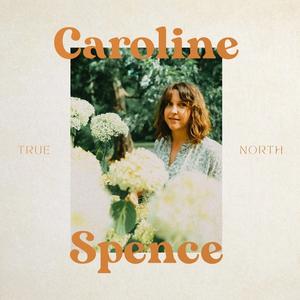




Link copied

“Time isn’t always what you thought,” Caroline Spence observes in her song ‘The Gift’. Strings and light percussion sprout and twist like vine, accentuating a story about the ruthlessness of time and finding acceptance within inevitability. Based upon her relationship with her late grandmother, the trickling ballad samples True North, out April 29, and captures the ephemeral nature of human existence.
The record, produced by Jordan Lehning, wades into these uncertain depths. An impossible task, Spence gently guides the listener through her experiences with loss and grief, towing the line between exposing every raw nerve and commodifying her pain. She keeps specific details close to the vest and lets the songwriting do the talking. 12 songs are the conduit through which she processes and understands tragedy and what it means to move on.
“I've made the decision not to talk about the specifics of some of my losses because of the way they affect the people I care about. But I think that grief is both singular and universal, and I felt compelled to write about it,” she says. “I wish that it was a topic that we were able to speak about more freely, and I think my belief in that has sort of allowed me to step outside of my emotional comfort zone.”
The last two years have wrought a high death toll unlike anything we’ve seen in 100 years, and the prevalence of death and its aftereffects is hard to ignore. “Now more than ever, I think anyone walking down the street is dealing with something like that. Whereas I think in the past the messaging I got was it was a little more shameful to talk about,” she offers. “It was a feeling that you are going to be a bummer 一 instead of being this person that really loved somebody and lost them. We should all be so lucky to love somebody so much that we miss them when they're gone.”
Western culture has an especially difficult time confronting and discussing death and grief. Spence offers her thoughts as to why that is: “That's a big question. People try to project strength a lot in America. Grief is not viewed as a strength, but I think ultimately, going through those cycles, you do come out stronger. You've survived something, and you've learned something about what it is to be a person. I definitely feel like it's allowed me to have a wider empathetic lens to other people.”
Spence began writing out her pain in the early months of the pandemic. “The record kind of grew out of that, and then I was in a season when I couldn't stop writing,” she says.
The process for ‘The Gift’, co-written with Matt Koziol, wrought an emotionally-charged conversation about both songwriters’ grandparents. From there, Spence reflected upon the notion that we “never really change” when we get older.
“You go through a lot of changes, but ultimately, you are yourself. That’s how my grandmother explained it. You think that time is this big transformative thing, and a lot of times it is. Time does heal a lot of things. But I think I am also the same person that I was when I was a little kid in a lot of ways.”
Later, Spence cultivates her grandmother’s personal mantra as the lyrical base in ‘The Next Good Time’, namely the hook. “Grit your teeth, get through it / And wait for the next good time,” she sings. She winds through stages of trouble, but it always comes back to those wise words.
“I'm actually looking at the scrap of paper I wrote it down on. I have it hanging at my desk. When she got diagnosed with cancer, she was like, ‘Well, you know, like I always say 一 grit your teeth, get through it, and wait for the next good time.’ And I was like, ‘I've never heard you say that in your life.’ I tried to write that song [many] times, and it never took the shape that I wanted it to, or it needed to.”
While on tour in Boston, she brought the seed of the idea to co-writer Lori McKenna, and it soon blossomed. “Having the other person's view of the story allowed it to have a more universal feeling that I couldn't express,” she notes.
With the closing track ‘There’s Always Room’, Spence gives herself room to ponder how in death we’re left with mostly unanswered questions, for better or worse. “So many questions, big and small / And you will forever hold the key,” she reflects, heartbeat percussion coursing in the background.
These questions, including wondering what someone would have done in life had they lived, are sharp and inescapable. “No matter the age of the person that you've lost you're going to have those things that feel unfinished. Sometimes, it feels like you should have asked more about their life,” she reflects. “It can be so frustrating and so painful 一 but it is what it is, you know?”
For now, Caroline Spence remains present and turns these musings into songwriting gold. If there’s anything else she’s learned through her grief, it’s that “having hard feelings” doesn’t scare her anymore. In fact, she openly welcomes them. “There's some days when you're grieving, and you can't be any other way. You have to let yourself feel things.”
She pours these feelings onto True North, and maybe one day, she’ll discover all the answers.
Tasked with celebrating special songs, Spence turns the dial back to her youth and those essential cuts that forever changed her relationship with music and set her down the songwriting path. Here are her five picks.
The Beatles - I Should Have Known Better
When I was little, between the ages of two and six, this song is probably all I listened to. My dad had made these tapes that were basically all the early Beatles records. That was my early music education.
I love watching A Hard Day's Night and this is one of the first songs they play in the movie. There's so many home videos of me singing that song. There's a video of me on roller skates, and I just wanted to be in that band. I would pretend I was George.
Passionate Kisses - Mary Chapin Carpenter
She is from the same part of Virginia that I'm from, and she’s a regional hero. I think she was my second concert that I ever saw - her at Wolf Trap with my family. And I would sing ‘She Thinks He’ll Keep Her’ - I was like twice divorced at ages seven and eight. I just loved her.
I love 'Passionate Kisses' so much. This is a twofer because I didn't realize until later that Lucinda Williams wrote it. I was falling back in love with her music, and I think in high school, it must have been, I was reading the liner notes and saw her name. I was like, ‘Oh, I've heard of that person. I suppose I should go listen to her and figure it out.’ Then, I found Car Wheels on a Gravel Road and it was everything I liked.
The Trapeze Swinger - Iron & Wine
This is a nine-minute song, and it was my go to comfort zone in high school. I would fall asleep to it every night on my iPod. It has this slow, meditative, gorgeous melody, and I absorbed all the lyrics. It was such a comfort for me during some hard times.
My family was going through grief and a divorce and stuff in high school. It reads like a poem, and that's something I really love in music. With this record, there's a few songs that don't have a chorus, or the chords don't change. I’m sort of letting things be their own meditative thing. It’s a new leaf I'm turning over in my writing.
Stealing Kisses - Lori McKenna
I picked this one not because it's my favorite of her songs, but because this song was released on her album Bittertown and then Faith Hill ended up recording it. That was the first time I drew the line between how songs appear on the radio and who wrote them - I realized that someone could be an artist or a songwriter like Lori and have someone else record it.
That opened up this whole other career path dream for me. I didn't move to Nashville to be an artist. I wanted to write for other people. I really do think that my path would have been different if that hadn't clicked in my brain.
Dress Blues - Jason Isbell
I listened to the Drive-By Truckers in high school. When Jason put out ‘Sirens of the Ditch,’ I picked it up and loved it. I just didn't know songs could do that. It set a high bar for me. It's poignant, and it's gentle. It's conversational, it's rich, and it’s a really beautiful, balanced story presented in a very simple way. That's the type of songwriting that I love, and that's something that I aspire to do when writing about tough stuff. Basically, it's a song about grief but with a bigger message.
---
True North is out on April 29 via Rounder Records. Read our full review of the album here.





